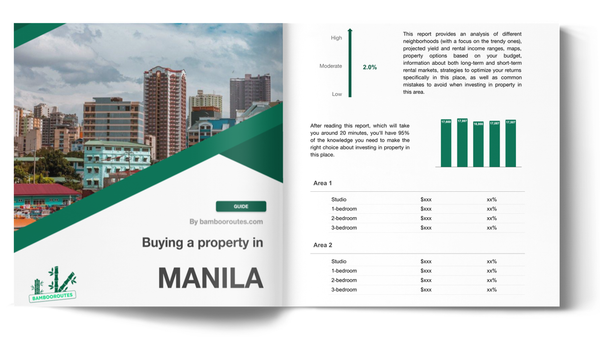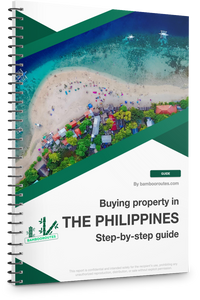Authored by the expert who managed and guided the team behind the Philippines Property Pack

Yes, the analysis of Manila's property market is included in our pack
Investing in the Manila real estate market can be an exciting opportunity, but it also comes with its own set of challenges and risks.
How can you ensure that your investment is safe? What are the common pitfalls to watch out for? And how can you make informed decisions to protect your hard-earned money?
In this article, we'll explore practical strategies to help you navigate the Manila real estate market wisely.
Actually, we know this market inside and out. We keep tabs on it regularly, and all our discoveries are reflected in the most recent version of the Philippines Property Pack
Lesser-Known Mistakes When Buying Property in Manila
When purchasing property in Manila, there are several specific pitfalls that buyers might not be aware of. These mistakes can lead to unexpected costs, legal issues, or dissatisfaction with the property. Below is a detailed table highlighting some of these lesser-known mistakes.
| Mistake | Details | Potential Consequences |
|---|---|---|
| Ignoring Traffic Patterns | Manila's traffic can significantly affect daily commutes. Buyers often overlook how traffic congestion can impact their quality of life. | Increased travel time, stress, and reduced time for personal activities. |
| Overlooking Flood Zones | Certain areas in Manila are prone to flooding during the rainy season. Buyers may not check flood history or drainage systems. | Property damage, increased insurance costs, and potential evacuation during severe weather. |
| Not Verifying Developer Reputation | Some developers may have a history of delayed projects or subpar construction quality. Buyers might not research developer backgrounds. | Delayed possession, poor construction quality, and potential legal disputes. |
| Underestimating Association Dues | Condominium and subdivision properties often have monthly association dues that can be substantial. | Unexpected financial burden and potential for increased dues over time. |
| Ignoring Local Zoning Laws | Zoning laws can affect property use and future development. Buyers may not be aware of restrictions or future changes. | Limitations on property modifications and potential decrease in property value. |
| Not Considering Public Transport Access | Proximity to public transport can greatly affect convenience and property value. Buyers might not prioritize this aspect. | Reduced accessibility and potential decrease in property desirability. |
| Overlooking Noise Pollution | Manila is a bustling city with areas that are noisier than others. Buyers may not assess noise levels at different times of the day. | Discomfort, stress, and potential impact on health and well-being. |
| Not Checking for Legal Disputes | Properties may have ongoing legal disputes or unclear titles. Buyers might not conduct thorough due diligence. | Legal complications, financial loss, and inability to transfer ownership. |
| Ignoring Future Development Plans | Future infrastructure or commercial developments can affect property value. Buyers may not research upcoming projects. | Unexpected changes in neighborhood dynamics and property value fluctuations. |
| Underestimating Renovation Costs | Older properties may require significant renovations. Buyers might not accurately estimate these costs. | Budget overruns and prolonged renovation timelines. |
| Not Consulting Local Experts | Local real estate agents and lawyers can provide valuable insights. Buyers might skip consulting these experts. | Missed opportunities for better deals and potential legal oversights. |
| Overlooking Community Amenities | Access to amenities like parks, schools, and shopping centers can affect living experience. Buyers may not prioritize these factors. | Reduced quality of life and potential decrease in property appeal. |
Don't lose money on your property in the Philippines
100% of people who have lost money in the Philippines have spent less than 1 hour researching the market. We have reviewed everything there is to know. Grab our guide now.

What You Need to Know Before Investing in Manila Real Estate
What are the key factors affecting property prices in Manila?
Property prices in Manila are influenced by location, with areas like Makati and Bonifacio Global City commanding higher prices due to their business hubs.
Infrastructure developments, such as new roads or public transport lines, can significantly impact property values.
Economic factors, including interest rates and inflation, also play a crucial role in determining property prices.
Want to explore this further?
How can I assess the potential rental yield of a property in Manila?
To calculate rental yield, divide the annual rental income by the property's purchase price and multiply by 100 to get a percentage.
In Manila, rental yields typically range from 4% to 6%, depending on the property's location and condition.
Consider factors like occupancy rates and maintenance costs to get a more accurate estimate of potential returns.
Want to explore this further?
What are the common pitfalls for foreign investors in the Manila real estate market?
Foreign investors often face challenges with property ownership laws, as they can only own condominiums and not land.
Understanding local market dynamics and legal requirements is crucial to avoid costly mistakes.
Engaging a reputable local real estate agent or lawyer can help navigate these complexities.
Want to explore this further?
How does the pre-selling market work in Manila, and what are its risks?
Pre-selling involves buying a property before it's completed, often at a lower price than finished units.
While it offers potential savings, risks include project delays or cancellations, which can affect investment returns.
Research the developer's track record and project timelines to mitigate these risks.
What are the transaction costs associated with buying property in Manila?
Transaction costs typically include transfer taxes, registration fees, and notarial fees, amounting to about 5% to 8% of the property's purchase price.
Buyers should also budget for additional costs like agent commissions and legal fees.
Understanding these costs upfront can help in planning your investment budget effectively.
Buying real estate in the Philippines can be risky
An increasing number of foreign investors are showing interest in the Philippines. However, 90% of them will make mistakes. Avoid the pitfalls with our comprehensive guide.

Want to explore this further?
How can I verify the legitimacy of a property title in Manila?
To verify a property's title, request a certified true copy from the Registry of Deeds and check for any encumbrances or liens.
Engage a trusted lawyer or title company to conduct a thorough due diligence process.
Ensuring the title's legitimacy can prevent future legal disputes and financial losses.
What is the average price per square meter for residential properties in Manila?
The average price per square meter for residential properties in Manila varies significantly by location.
In prime areas like Makati, prices can reach up to PHP 250,000 per square meter, while in less central areas, it may be around PHP 100,000 per square meter.
Understanding these price ranges can help in setting realistic expectations for your investment.
Want to explore this further?
How does the economic climate in the Philippines affect real estate investments in Manila?
The economic climate, including GDP growth and employment rates, directly impacts real estate demand and prices.
During periods of economic growth, property values and rental demand typically increase, offering better returns.
Conversely, economic downturns can lead to decreased demand and potential price corrections.
What are the financing options available for purchasing property in Manila?
Financing options include bank loans, in-house financing from developers, and Pag-IBIG Fund loans for eligible buyers.
Interest rates for bank loans typically range from 6% to 8% per annum, depending on the loan term and borrower's credit profile.
Comparing different financing options can help in choosing the most cost-effective solution for your investment.
How can I protect my investment from natural disasters common in Manila?
Investing in properties with robust construction standards and located in less flood-prone areas can mitigate risks.
Purchasing comprehensive property insurance that covers natural disasters is essential for financial protection.
Staying informed about local disaster preparedness measures can also help safeguard your investment.
What is the impact of government policies on the Manila real estate market?
Government policies, such as tax incentives for developers or restrictions on foreign ownership, can influence market dynamics.
Infrastructure projects initiated by the government can enhance property values in affected areas.
Staying updated on policy changes can help investors make informed decisions and capitalize on opportunities.
How can I ensure a good return on investment (ROI) in the Manila real estate market?
To ensure a good ROI, focus on properties in high-demand areas with strong rental potential and capital appreciation prospects.
Regularly review and adjust rental rates to stay competitive in the market.
Maintaining the property's condition and addressing tenant needs promptly can also enhance investment returns.
